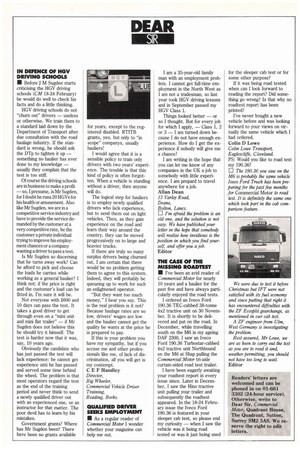IN DEFENCE Of HGV DRIVING SCHOOLS • Before .1 M
Page 44

If you've noticed an error in this article please click here to report it so we can fix it.
Sugden starts criticising the HGV driving schools (CM 18-24 February) he would do well to check his facts and do a little thinking.
HGV driving schools do not "churn out" drivers — useless or otherwise. We train them to a standard laid down by the Department of Transport after due consultation with the road haulage industry. If the standard is wrong, he should ask the DTp to tighten it up — something no haulier has ever done to my knowledge — usually they complain that the test is too stiff.
Of course the driving schools are in business to make a profit —so, I presume, is Mr Sugden, for I doubt he runs 20 HGVs for his health or amusement. Also like Mr Sugden, we are in a competitive service industry and have to provide the service demanded by the customer at a very competitive rate, be the customer a private individual trying to improve his employment chances or a company wanting a driver to pass a test.
Is Mr Sugden so discerning that he turns away work? Can he afford to pick and choose the loads he carries while working as a general haulier? I think not; if the price is right and the customer's load can be fitted in, I'm sure it will be.
Not everyone with £600 and 10 days can pass the test. It takes a good driver to get through even on a "mini unit and mini fiat trailer" — if Mr Sugden does not beleive this he should try it himself. The test is harder now that it was, say, 10 years ago.
Obviously the candidate who has just passed the test will lack experience: he cannot get experience unti he has passed and served some time behind the wheel. The problem is that most operators regard the test as the end of the training period and never think to send a newly qualified driver out with an experienced one, or an instructor for that matter. The poor devil has to learn by his mistakes.
Government grants? Where has Mr Sugden been? There have been no grants available for years, except to the registered disabled. RTITB grants, yes, but only to "in scope" companys, usually hauliers!
I would agree that it is a sensible policy to train only drivers with two years' experience. The trouble is that this kind of policy is often forgotten. When a vehicle is standing without a driver, then anyone will do.
The logical step for hauliers is to employ newly qualified drivers who lack experience, but to send them out on light vehicles. Then, as they gain experience on the road and learn their way around the country, they can be moved progressively on to large and heavier trucks.
If there are truly so many surplus drivers being churned out, I am certain that there would be no problem getting them to agree to this system. Indeed, they will probably be queueing up to work for such an enlightened operator.
"But they want too much money," I hear you say. This is the real problem is it not? Because haulage rates are so low, drivers' wages are low and the haulier cannot get the quality he wants at the price he is prepared to pay.
If this is your problem you have my sympathy, but if you accuse me and other professionals like me, of lack of discrimination, all you will get is my contempt.
C E F Handley
Director, Big Wheeler, Commercial Vehicle Driver Training, Reading, Berks.




























































































